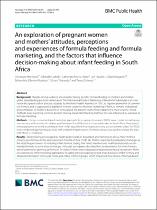| dc.contributor.author | Horwood, Christian | |
| dc.contributor.author | Luthuli, Silondile | |
| dc.contributor.author | Pereira‑Kotze, Catherine | |
| dc.date.accessioned | 2022-05-17T15:25:37Z | |
| dc.date.available | 2022-05-17T15:25:37Z | |
| dc.date.issued | 2022 | |
| dc.identifier.citation | Horwood, C., Luthuli, S., Pereira-Kotze, C., Haskins, L., Kingston, G., Dlamini-Nqeketo, S., Tshitaudzi, G., & Doherty, T. (2022). An exploration of pregnant women and mothers’ attitudes, perceptions and experiences of formula feeding and formula marketing, and the factors that influence decision-making about infant feeding in South Africa. BMC Public Health, 22(1) | en_US |
| dc.identifier.other | https://doi.org/10.1186/s12889-022-12784-y | |
| dc.identifier.uri | http://hdl.handle.net/10566/7407 | |
| dc.description.abstract | Background: Despite strong evidence showing the lifelong benefts of breastfeeding for mothers and children,
global breastfeeding practices remain poor. The International Code of Marketing of Breastmilk Substitutes is an inter‑
nationally agreed code of practice, adopted by the World Health Assembly in 1981, to regulate promotion of commer‑
cial formula, and is supported by legislation in many countries. However, marketing of formula remains widespread
and contributes to mother’s decisions to formula feed. We present South African data from a multi-country, mixedmethods study exploring women’s decision-making about infant feeding and how this was infuenced by exposure to
formula marketing.
Methods: Using a consumer-based marketing approach, focus group discussions (FGDs) were conducted with preg‑
nant women and mothers of children aged between 0 and 18months in two urban sites in South Africa. Participants
were purposively selected according to their child’s age, infant feeding practices and socioeconomic status. Ten FGDs
were conducted during February 2020 with a total of 69 participants. Thematic analysis was used to analyse the data
with NVivo v.12 software.
Results: Despite being encouraged by health professionals to breastfeed and intending to do so, many mothers
chose to give formula in the early weeks and months of their child’s life. Mothers reported breastfeeding challenges as
the most frequent reason for initiating infant formula, stating that family members and health professionals recom‑
mended formula to solve these challenges. Although participants described few advertisements for infant formula,
advertisements for ‘growing-up’ formulas for older children were widespread and promoted brand recognition. Moth‑
ers experienced other marketing approaches including attractive packaging and shop displays of infant formula, and
obtained information from social media and online mothers’ groups, which influenced their choice of formula brand. | en_US |
| dc.language.iso | en | en_US |
| dc.publisher | BMC | en_US |
| dc.subject | Formula feeding | en_US |
| dc.subject | International code of marketing of breast-milk substitutes | en_US |
| dc.subject | Marketing | en_US |
| dc.subject | Infant feeding practices | en_US |
| dc.title | An exploration of pregnant women and mothers’ attitudes, perceptions and experiences of formula feeding and formula marketing, and the factors that infuence decision-making about infant feeding in South Africa | en_US |
| dc.type | Article | en_US |

